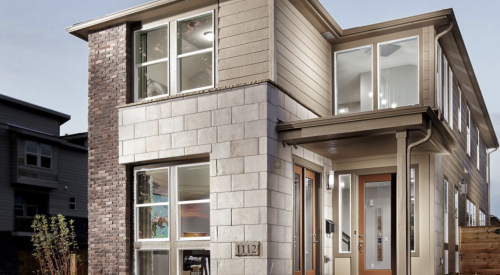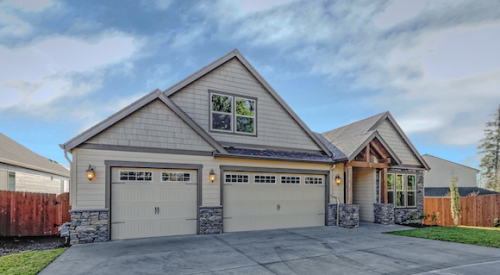| "We don’t send managers to a new city until they complete our eight-year training program." -- Lonnie Fedrick, Newmark Homes
|
Lonnie Fedrick’s Houston-based Newmark Homes is a strange duck: public, but not very, and decidedly disinterested in dancing to Wall Street’s tune. But even if Fedrick is a tad old-fashioned, he might have the right plan for growth in the roaring 2000s, in which there are signs the growth-by-acquisition model is leaking oil. Fedrick’s new millennium vehicle looks a little like a Model T (but don’t fix it ‘cause it ain’t broke): He counts on training young managers and turning them loose in greenfield startups.
Newmark is 80% owned by Technical Olympic Inc., a Greek heavy construction behemoth traded on the Athens stock exchange. Technical acquired that 80% interest several months ago from Pacific Realty, a holding company owned by Pacific Wire & Cable, a Taiwanese conglomerate that took Newmark (or at least 20% of it) public on the Nasdaq exchange in March 1998.
The company traded at a 10 multiple shortly after. But like the stock of many other small-cap public builders, Newmark’s stock now languishes at a 4 to 4-1/2 multiple, despite carefully controlled growth from $406.4 million in 1998 revenue to $484.7 million in 1999. Unit volume was also up, from 1,874 to 1,989. And Newmark operates in the high-margin end of the pricing spectrum, big move-up houses priced above $200,000. Even so, Newmark dropped two spots on PB’s Giants list, to No. 33 this year.
Fedrick was Exhibit A in the road show for the 1998 IPO. It’s way better than even money he won’t do it again.
"It wasn’t my idea in the first place," he says with a laugh. "Even at a 10 P/E, it’s not a great thing, but there is absolutely no reason for a home builder to want to be public now. Not even the biggest builders are getting much out of it. And I don’t see that changing anytime soon. We outperformed our projections, and still we trade at a 4 multiple. And the truth is, there’s nothing we can do. The whole housing sector is out of favor. And yet it costs us $1.5 million to $2 million a year to be public.
"Mergers of equals, where both are public, are the only thing that makes any sense today. If we did that, we’d have a $1 billion company, but what good would that do us? I’d rather stay where we are," says Fedrick. "We should do over $500 million this year, just on the startups we’ve already got in place."
Ah, the startups. The bright spot in a world gone bleak. (How can that happen in the midst of a housing boom?) Fedrick is adding markets the old-fashioned way, by hiring and training managers and sending them off to do startups of new operations in other cities. He did it last year in Nashville, Tenn., and Charlotte, N.C. The Nashville operation turned black in eight months. "We sold 85 houses the first year, at an average price of $415,000," Fedrick reports. Charlotte is a tougher nut, but Fedrick predicts it will hit the black this year or early next year.
What makes Fedrick’s approach truly old-fashioned is that the young managers he sends on the road might actually be ready for it, even amid industrywide shortages in management talent.
"We hire them right out of college. But we don’t send them to a new city until they complete our eight-year training program," says Fedrick. "It takes five years to get through the building program, which starts at raw super and moves through construction manager to project manager. Then we put them through another two years in our custom company, Fedrick-Harris Homes, building million-dollar homes. Then they get a year or two in sales management before they get to leave Houston."
Fedrick himself teaches construction management. "Teaching them and working with them for years is what pays off for us. We get dedicated people who believe in our philosophy and have our culture ingrained in them. That’s the way I’ve grown this company from the very beginning. I’ve always hired kids right out of college."
He admits the dropout rate is high. "We lose about two-thirds of them along the way, mostly in the first year, when they learn how hard we expect them to work," he says. <>Newmark got into the South Florida market by acquisition of The Adler Cos. in 1995 and added Westbrooke Homes in 1998, but expansions to Nashville, Charlotte/Greensboro and most recently to San Antonio have all been done from scratch by Fedrick’s young turks. "We have two mature markets, Houston and Austin, and we do about 275 houses a year in Dallas. But we won’t grow much in Dallas because every national builder in the country is in there, and that’s driven lot prices up and margins down.
"In San Antonio, we just sent people in from Austin, and they are doing great. They’ll hit the black within eight to nine months. Right now, we have two more groups of young managers just about ready to go. I’m looking at two cities, Indianapolis and Atlanta. We’ll probably pick one for a startup this year. Our greenfields are very calculated, and we keep them spread out."
Fedrick is a stickler for making sure houses are 100% complete before closing. To make sure no one closes a house with punchlist items outstanding, he sends "post-closing" inspectors to every house within 30 days after occupancy. Those individuals do not work for the city manager. They report directly to senior management. And if they find outstanding items, Fedrick imposes stiff penalties.
"That keeps us out of the courthouse," he says. "We’ve never been there yet with a buyer. That doesn’t mean we never have problems. We’ve gone back and fixed things five, even six years after closing. But building them right and standing behind the product are critical in the high-end move-up and relocation markets we concentrate on.
"It pays off for us in the long run. One of the ways I get into new markets is by getting phone calls from developers complaining about the builders in their town not doing their warranty work," says Fedrick.
When quality is on the decline because of shortages in good supers and skilled labor, finding a way to get houses built right and guaranteeing that they are might be the best strategy of all. Fedrick’s Model T runs smoothly. But it takes eight years to build one.
"That’s the trouble with Wall Street," he says. "It doesn’t even notice 20% growth, and that’s huge for a home builder. Forced growth is a dangerous thing, when you start trying to push a market that’s not there."
Also See Movers and Shakers:
Lennar Redefines Bigness
Spectrum Skanska Hits Highest Price Point
Regis Homes Ups Ante on Quality
Morrison Leads the Charge to TND
Brookfield Has Steely Resolve
Estridge Pioneers "First Mile"
Crossman: Quiet but Profitable
ALH: Private Acquisitor Rising












